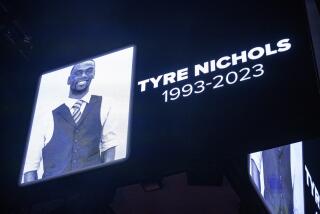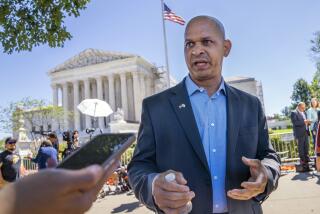Prospective King Jurors Sense Trial’s Significance : Trial: Panelists are eager to serve in the historic case despite fears about rioting. Some say the motorist should have testified in last year’s state proceedings.
Several prospective jurors in the federal civil rights trial of Rodney G. King said Wednesday they think the black motorist should have testified during an earlier state trial about his beating by white police officers.
“I feel if Rodney King had testified, the riots and everything might not have happened because they would have been able to hear Rodney King’s side and tell if he was telling the truth,” said one woman.
“I wouldn’t have been so shocked and surprised at the verdicts,” she said.
The comments came as defense lawyer Michael Stone asked the 12 prospective jurors whether they thought prosecutors in the earlier trial “did not use their best efforts to win a conviction.”
A male prospect said, “Rodney King was not called as a witness. ... I appreciate that he’s going to be presented in this trial.”
Prosecutors told jurors Tuesday to expect an appearance by King.
The responses came in the second day of jury questioning in the civil rights trial of Officers Laurence Powell, Theodore Briseno, Timothy Wind and Sgt. Stacey Koon, who are charged in the March 3, 1991, beating that was videotaped and broadcast worldwide. The men were found not guilty on all but one charge in a state trial last spring, triggering deadly rioting.
Some panelists said they feared new riots if the officers are acquitted but insisted it wouldn’t affect their judgment.
“I fear some backlash, yes,” said one man. “It would probably be something like what happened last (spring), but not that extreme. . . . People are going to use it.”
All panelists said they could be fair. One man said he thought convicting the officers would be a symbol that blacks have a chance for justice in the United States.
Most of the panelists appeared eager to serve on the case because of its high profile.
“My first thought was history,” a young woman said of the day she was called. “I still feel the same way.”
A young former security guard said, “I thought it’s a rare opportunity, a once-in-a-lifetime opportunity, something I wouldn’t have passed up. This is one of the biggest criminal cases in history.”
Some said they might write magazine articles or books about the case, and one woman said she is keeping a diary already. Asked if she might sell her story, she said, “I’m a capitalist, of course, being an American. But I haven’t given great thought to that.”
The questioning disclosed that prospective jurors are so familiar with the case that some reached their own verdicts in the earlier trial.
One woman who watched the trial on TV said she would have convicted at least three of the officers.
“I didn’t have a preconceived idea going into the trial,” she said. “I came to that conclusion at the end.”
“Would you have found them all guilty?” asked defense attorney Ira Salzman.
“Maybe not all four, but three,” said the woman.
Asked whom she would have acquitted, the woman named Briseno, the officer who broke ranks and testified against his co-defendants.
The woman insisted she could put aside all she knows and judge the men fairly in the new trial.
Davies broke with federal tradition in allowing lawyers, not just the judge, to question jurors, saying the importance of the case required it.
He said he hoped to conclude the jury questioning Thursday.
The first 12 panelists questioned are part of a random draw of 73 prospects seated in the courtroom. They came from a pool of 284 who filled out written questionnaires, all of whom are being referred to by number to protect their identities.
Davies freed 61 of those still waiting to be called because they were needed in other cases.
More to Read
Sign up for Essential California
The most important California stories and recommendations in your inbox every morning.
You may occasionally receive promotional content from the Los Angeles Times.










